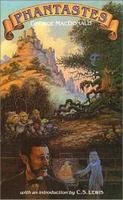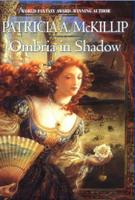Told from the point of view of Anodos, a young man who has just inherited his father's house and possessions-- and who discovers that his grandmother was actually a fairy. At first he doesn't believe her, but expresses a desire to go to Fairy Land. The next morning when he wakes up, his bedroom gradually transforms into a forest glade in Fairy Land. The rest of the story is made up of his travels through Fairy Land, and the people and creatures he meets.
Phantastes is one of those books that I've heard about for a long time-- supposedly it inspired people like C. S. Lewis and Tolkien, and helped them believe that it was possible to write Christian fantasy and original fairy tales. Lewis says in his introduction that the imaginative world of MacDonald's works is "the divine, magical, terrifying and ecstatic reality in which we all live", and suggests that Phantastes sort of baptized his imagination, long before he became a Christian. So, I had some pretty high expectations, and as a result of that, I was a little disappointed. This book feels more like a series of short stories, which all happen to feature the same character, the narrator. It didn't feel like there was a great deal of progression, and it certainly didn't feel like a novel, as MacDonald's Lillith does.
Many of the episodes are obviously allegorical, and of course Anodos' whole journey is supposed to be some kind of spiritual progression. In one village, Anodos finds that all of the people look attractive until you get within a certain distance of them. One time, Anodos is protected by the lady of the Beech tree from the evil Ash tree. Another episode seems like a somewhat disturbing allegory of female sexuality; Anodos meets a young girl who is almost a woman, with a little crystal globe which is "at once her plaything and her greatest treasure"-- she doesn't want to him touch it, but when he does, the globe vibrates and makes beautiful music. Eventually the globe becomes irresistible to Anodos, and he wants it so badly that he fights the girl, and breaks it. Later on, Anodos meets her again, and she says losing the crystal globe was a blessing in disguise, because without it to make music for her, she learned to sing. At some point, Anodos finds a beautiful white lady asleep within a block of clear marble, so he sings her to wakefulness and freedom, and spends much of the rest of the story searching for her. Another time, Anodos opens a door he has been warned not to-- and his shadow finds him, and trails along with him for the rest of his travels through Fairy Land.
MacDonald's style is not always my favorite-- the story is interrupted with "songs" that the narrator translates and records for us (often noting that the words were different, but it was "something like this", or that "I could not understand, but which left in me a feeling like this"). The quality of this work seemed a little uneven; some of the stories are much more engaging and compelling than others. Anodos' journey didn't seem quite as life-changing as it ought to have been, although perhaps I have missed details or not understood aspects of MacDonald's story. Phantastes is definitely worth reading at least once, if only for the better stories and the influence it has had on other writers. It is a book I will probably come back to in a few years, and maybe I will understand it better then.
| Title: | Phantastes |
|---|---|
| Author: | George MacDonald |
| Date published: | 1858 |
| Genre: | Fantasy |
| Number of pages: | 185 |




